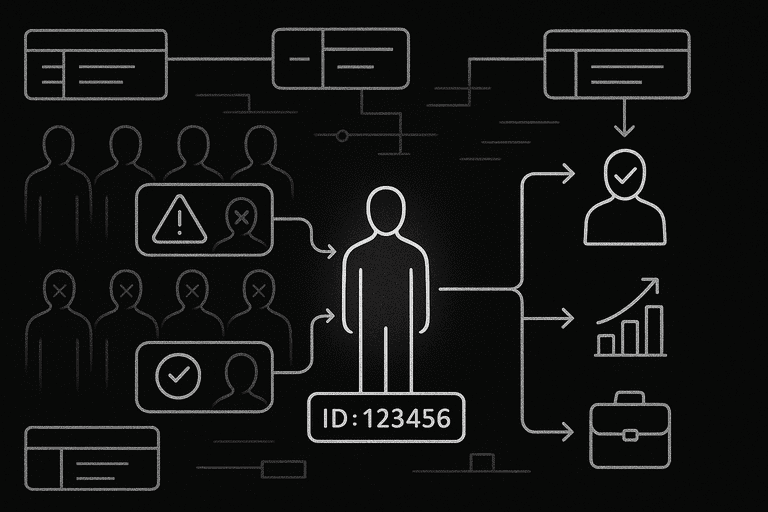What if I told you that your only escape in a world of chaos and uncertainty is learning?
We are in a unique era of rapid change due to technological advancement and innovation. This era brings new opportunities and will probably diminish previous opportunities.
As we transition into the future of work, those who prioritize continuous learning will not only adapt to change but will also thrive in it.
One of the most influential inventions of all time is the Internet.
The Internet provides access to an unprecedented amount of information. As of 2021, there were over 1.8 billion websites, making a vast array of knowledge available at the fingertips of everyone (including you and me). This has revolutionized education and self-learning, allowing us to pursue knowledge on virtually any topic.
Gone are the days when people went to school to learn a profession with the assurance that an excellent job in a big company or organization was waiting for them when they graduated.
My friend, the reverse is the case today. The future of work is uncertain and unknown. Staying ahead of the curve is crucial to our survival.
Together, we’ll explore why learning is crucial in today’s world and practical steps you can take to cultivate this culture in your own life.
By the way, I wrote about the future of work here just in case you need some background knowledge.
Learning and Why It Matters
As we look around, it’s evident that many of us face barriers in our lives. Our progress in life seems stuck. We keep complaining of a lack of opportunities, whereas there are hundreds of opportunities but no capacity.
Unconsciously, we occupy ourselves with irrelevant things that will not benefit our lives.
A lot of things are fighting for our attention daily. Information is abundant, but action is scarce.
If you want to bring back order in your life, then you need to fuel your curiosity, and that is precisely what learning does to you.
As everything moves toward automation and artificial intelligence, I believe continuous learning is how we will thrive in these times.
Learning is how we grow, improve, and adapt to change. This is why developing a culture of learning is essential.
Think about how happy and fulfilled you’d be when you look back five years to see how your life has been transformed by pursuing and learning the things that interest you.
As someone who has experienced the transformative power of continuous learning, I am confident your life will not remain the same!
If you have been following me for a while, you know I am a big advocate for self-development and a growth mindset, which inequally translates to learning because you can’t grow personally if you are unwilling to learn.
If you need some reasons why you need to cultivate a learning culture, here you go.
- Adaptability: In a world where job roles constantly evolve, a culture of learning fosters adaptability. When you equip yourself with new skills, you can pivot seamlessly between tasks and responsibilities, reducing the impact of workforce disruptions.
- Innovation: Continuous learning encourages innovation. When you feel safe experimenting and learning from failures, you’re more likely to develop creative solutions to complex problems. But the caveat here is that you must apply what you learn to a real-life project.
- Skill Development: The rapid pace of technological advancement necessitates upskilling. The essence of learning is to improve and grow your skill stack, giving you more leverage in the labour market.
- Attracting Opportunities: Opportunities are everywhere. By cultivating a learning culture, you can position yourself as a valuable asset in any of your areas of interest.
A Paradigm Shift
Learning is underrated. People fail to acknowledge it, or maybe they just can’t see how it has been instrumental in their lives.
From your mother’s womb, you came into this world you knew nothing about.
As a child, you learned how to feed yourself, crawl, and walk, first learning how to stand all by yourself.
You learned how to speak. You learned how to communicate with others. You even learned what it is to feel pain and how it feels to love.
I’m sure you are proud of how you have become an adult.
Perspective is everything. Your viewpoint of everything will determine how you approach it.
If you zoom out and have a big-picture perspective of your life, you’ll realize that whoever you have become results from the conscious and unconscious learnings that have occurred in your life over time.
This has shaped your interests, your personality, and your goals.
So, if you want your future self to be proud of who he has become, then you need to make an effort to make learning a part of your lifestyle.
Why Does Learning Seem Difficult?
Learning is a mindset. It is an activity that requires a lot of mental carriage and discipline.
People think learning is overrated, and because of this false belief, they prefer to mental masturbate (the feeling you get when you come across new information but you don’t put this information to use).
According to research, mental readiness, often “readiness to learn,” is crucial to the learning process. This concept encompasses an individual’s cognitive and emotional preparedness to engage in learning activities.
This invariably means that the first learning requirement is mentally accepting that you cannot grow without learning. If your mind is not at this level, I’m sorry, there’s nothing you can do; learning will always seem impossible or difficult. This is probably why learning is complex for you.
A research paper published in Educational Psychology highlights that mentally prepared and motivated students are more likely to engage deeply in learning and achieve better academic outcomes.
Another thing that often causes difficulty in learning is assuming you already know. Confidence is usually ignorance, which can be traced back to a fixed mindset.
Individuals with a fixed mindset think that their capabilities are set in stone and that no effort or learning can significantly alter their inherent qualities.
This mindset contrasts with a growth mindset, where individuals believe that abilities and intelligence can be developed through dedication and hard work.
Ego can also be a significant obstacle to learning. When you consider yourself an expert and assume you know everything there is to know on a particular subject.
The other day, I stumbled on one of my old notes, which I used to jot down my programming learnings; I was embarrassly-proud to see how far I had come.
If you’re not embarrassed by what you thought you knew last year, you need to learn more and faster.
When you are learning, you’ll feel stupid and vulnerable.
Steps to Cultivate a Culture of Learning
Just the other day, I was discussing my learning experience with my wife and sharing all the unique patterns I have connected with in the last decade of continuous self-development.
The steps I’m able to share here are what have worked for me during these 10 years of continuous learning. It was a period filled with doubts, discomfort, procrastination, and start-and-stop.
If I told you this period was smooth, just like I’m explaining it, then I would be lying to you. Learning, especially self-learning, requires a lot of discipline and focus backed up with curiosity.
Now let’s look at some practical steps you can take to cultivate this culture in your own life:
Please note that these steps are not arranged in their order of importance–they are important individually and as a combined unit.
Foster a Growth Mindset
I chose to start with this because it’s a very important component in this whole process. I could go on to write 5,000 words on why fostering a growth mindset is very important in cultivating a learning culture.
The growth mindset was a concept developed by psychologist Carol Dweck. Her book Mindset argues that a growth mindset is the belief that abilities and intelligence can be developed through dedication, hard work, and perseverance. In contrast, a fixed mindset assumes that intelligence and talent are static traits.
When you embrace a growth mindset, you open yourself to endless personal and professional growth possibilities. Developing a growth mindset is the first step in unlocking the culture of learning because it helps you view learning as a lifelong journey.
This is the mindset everyone needs to have, especially in this period of rapid technological advancement.
Set Clear Learning Goals
There is a verse in the bible that states:
“Write down the revelation and make it plain on tablets so that a herald may run with it.” – Habakkuk 2:2 (NIV).
Define your learning objectives by identifying what you want to learn, why it matters, and how it will impact your life. This could involve acquiring a new skill, expanding your knowledge in a particular area, or improving a specific competency.
Divide your learning goals into smaller, manageable tasks. This makes the process less overwhelming and helps you track progress. This is how I approach my learning goals. I set a macro goal, zoom in on it, and set a micro goal. The macro goal is like the big picture goal, while the micro goals are the frogs I need to eat for the macro goal to become a reality.
Create a Learning Schedule
Setting goals is not enough. You have to have a strategic plan for achieving those goals, and this is where the learning schedule comes into play.
Allocate a specific time each day for learning, even if it’s just 15-30 minutes. Consistency is critical to forming a habit. I have a learning schedule for the first two hours of my day (5 a.m.—7 a.m.); this is where I read books, which helps me in my research, and this is where I also do my writing.
I try to commit to this routine as much as possible daily, and in addition to my morning schedule, I have also allocated time during the day to engage in research.
Incorporate short, focused learning sessions into your day. This is called microlearning, which can effectively keep up with your learning goals without requiring a significant time commitment.
Leverage Technology for Learning
We live in an era of technology, and technological tools have simplified many processes. Identify areas in your learning where you can leverage technological tools.
I believe technology can help improve your learning experience. One way to do this is to utilize online learning platforms like Udemy, Udacity, Coursera, and YouTube. These platforms have concise learning materials, including videos, to help you understand complex concepts and topics.
Personally, I use the Amazon Audible app to listen to audiobooks when I’m walking or exercising. Other tools I use are Trello for managing my goals and learning schedules, Notion for organizing my thoughts and ideas about learning, and many more.
Just find what works for you and use it.
Recognize and Reward Your Learning Efforts
Part of what I told my wife was that one major thing that has always kept me in this learning circle is the feeling of accomplishment I get when I finish a learning goal I had set for myself. This feeling (dopamine) is like a mental boost to attempt the next learning goal on my list.
Acknowledge and celebrate your learning achievements, no matter how small; they increase your flow state, which you will always need to move forward in your learning journey.
Conclusion
So, my friend, in a world of uncertainty, especially around the future of work, self-development and learning are your compass.
Be intentional about what you learn and how you learn it. The benefits of a learning culture extend beyond individual growth; they encompass enhanced adaptability, innovation, engagement, and the ability to seize opportunities. As we embrace the future of work, let’s commit to creating environments where continuous learning is celebrated and supported.
This is why we are building FluideMinds, a platform and community dedicated to developing individuals who can adapt, learn, and grow no matter what the future holds for them.
If you want to be part of this community, feel free to join our waiting list here.
Till I talk to you again, keep learning.
– Destiny.






